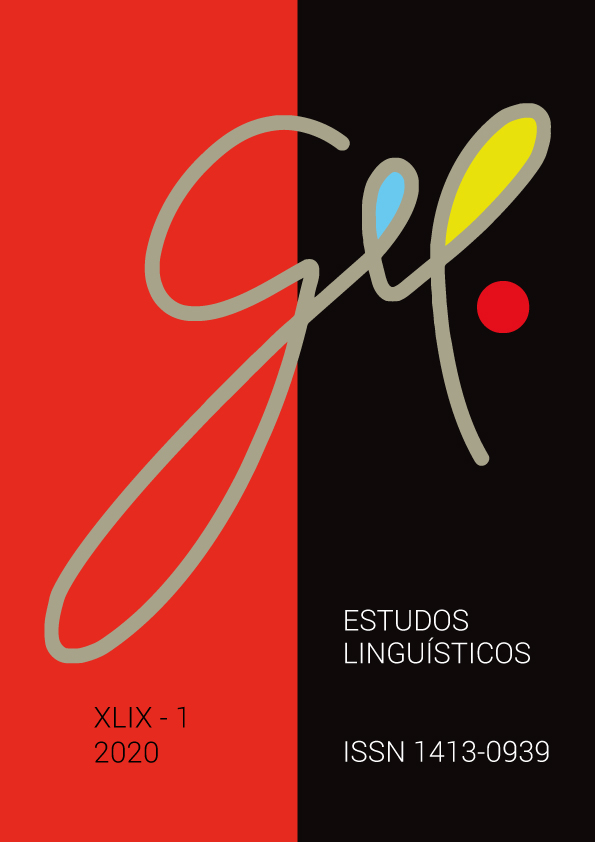Virtual exchanges and internationalization at home: reflections and implications for Applied Linguistics
DOI:
https://doi.org/10.21165/el.v49i1.2469Keywords:
internationalization, virtual exchange, Brazilian Virtual Exchange, English as a Lingua Franca.Abstract
Nowadays, telecollaborative projects using digital tools have been expanding the possibilities for universities internationalization around the world. In this article, we show the results of a research conducted in the context of the Brazilian Virtual Exchange Program (BRaVE-UNESP) on strategies to use English as a lingua franca in collaborative virtual exchange activities adopted by teachers from different areas of knowledge. Through qualitative methodology, we focus on teachers' perspectives on the difficulties and strategies used to deal with communication among students in the English language. The results bring reflections and implications for Applied Linguistics regarding the need to think about guidelines for a new role of the language teacher as a mediator in virtual exchange contexts.
Downloads
References
ALMEIDA FILHO, J. C. P. Maneiras de compreender lingüística aplicada. Revista do Programa de Pós-graduação em Letras, UFSM, n. 2, p. 4-10, 1991.
ANDRADE, M. R. M. (org.). Afetividade e emoções no ensino/aprendizagem de línguas: múltiplos. Coleção: Novas Perspectivas em Linguística Aplicada. v. 18. Campinas: Pontes, 2011.
BARCELOS, A. M. F.; VIEIRA-ABRAHÃO, M. H. Crenças e ensino de línguas: foco no professor, no aluno e na formação de professores. Campinas: Pontes, 2006.
BRASIL. A internacionalização na Universidade Brasileira: resultados do questionário aplicado pela Capes. Edição e composição: Diretoria de Relações Internacionais. Capes, Brasília, 2017. Disponível em: https://www.capes.gov.br/images/stories/download/diversos/A-internacionalizacao-nas-IES-brasileiras.pdf. Acesso em: 16 ago. 2019.
CONSOLO, D. A; TEIXEIRA DA SILVA, V. L. Desenvolvimento da proficiência oral em inglês em alunos universitários: análise de tarefas e da qualidade das interações verbais. In: SILVA, K. A.; DANIEL, F. G.; KANEKO-MARQUES, S. M.; SALOMÃO, A. C. B. A formação de Professores de Línguas: novos olhares. Campinas: Pontes, 2011. p. 127-146.
COYLE, D. Theory and planning for effective classrooms: Supporting students in content and language integrated learning contexts. In: MASIH, J. (ed.). Learning Through a Foreign Language: Models, Methods and Outcomes. London, CILT Publications, 1999.
CROWTHER, P.; JORIS, M.; OTTEN, M.; NILSSON, B.; TEEKENS, H.; WÄCHTER, B. Internationalisation at Home: A Position Paper. Amsterdam: EAIE, 2001. Disponível em: https://www.internationalisering.nl/wp-content/uploads/2015/04/Internationalisation-at-Home-A-Position-Paper.pdf. Acesso em: 20 jan. 2020.
DORNYEI, Z. Research Methods in Applied Linguistics. Oxford: Oxford University Press, 2007.
FARIAS, M.; ARMENDÁRIZ, A. M.; GIL, G.; GIMENEZ, T.; N.; CLAVIJO OLARTE, A.; ABRAHAMS, M. J. Sociocultural and political issues in English teacher education: policies and training in Argentina, Brazil, Chile and Colombia. In: GIL, G.; VIEIRA-ABRAHÃO, M. H. Educação de Professores de Línguas: os desafios do formador. Campinas: Pontes: 2008. p. 23-44.
GARCÍA, O.; WEI, L. Translanguaging: Language, Bilingualism and Education. New York: Palgrave Macmillan, 2014.
GIL, G. O ensino do inglês, do português e do espanhol como línguas estrangeiras no Brasil e na Argentina: uma comparação glotopolítica. Helb, Brasília, v. 3, n. 1, 2009 [não paginado]. Disponível em: https://bit.ly/2z9iucJ. Acesso em: 16 ago. 2019.
HASHIGUTI, S. T. Can we speak English? Reflections on the unspoken EFL in Brazil. Trabalhos em Linguística Aplicada, Campinas, v. 56, n. 1, p. 213-233, 2017. Disponível em: http://dx.doi.org/10.1590/010318135150200431. Acesso em: 16 ago. 2019.
KRAMSCH, C. Cultura no ensino de língua estrangeira/ ‘Culture in Foreign Language Teaching’. Bakhtiniana, São Paulo, v. 12, n. 3, p. 134-152, set. /dez. 2017.
LEFFA, V. J. Identidade e aprendizagem de línguas. In: SILVA, K. A.; DANIEL, F. G.; KANEKO MARQUES, S. M.; SALOMÃO, A. C. B. (org.). A formação de professores de línguas: novos olhares. v. 2. São Paulo: Pontes, 2012. p. 51-81.
LIMA, D. C. (ed.). Language and its Cultural Substrate: Perspectives for a Globalized World. Campinas: Pontes, 2012.
O’DOWD, R. (ed.). Online Intercultural Exchange: An Introduction for Foreign Language Teachers. Clevedon: Multilingual Matters, 2007.
O’DOWD, R. From telecollaboration to virtual exchange: state-of-the-art and the role of UNICollaboration in moving forward. Journal of Virtual Exchange, n. 1, p. 1-23, 2018.
O’DOWD, R.; RITTER, M. Understanding and working with ‘failed communication’ in telecollaborative exchanges. CALICO Journal, v. 23, n. 3, p. 623-642, 2006.
PAIVA, V. L. M. O. O outro na aprendizagem de línguas. In: HERMONT, A. B.; ESPÍRITO SANO, R. S.; CAVALACANTE, S. M. S. Linguagem e cognição: diferentes perspectivas, de cada lugar um outro olhar. Belo Horizonte: Editora PUCMINAS, 2010. p. 203-217.
PAIVA, V. L. M. O. Interação e aquisição de segunda língua: uma perspectiva ecológica. In: GERHARDT, A. F. L. M.; AMORIM, M. A.; CARVALHO, A. M. (org.). Linguística aplicada e ensino de língua e literatura. Campinas: Pontes Editores, 2013. p. 187-205.
SALOMÃO, A. C. B. Vizinhança global ou proximidade imposta? Impactos da comunicação intercultural mediada por computador sobre o papel da cultura no ensino de língua inglesa. D.E.L.T.A., São Paulo, v. 27, n. 2, p. 235-256, 2011.
SEIDLHOFER, B. Understanding English as a Lingua Franca. Oxford: Oxford University Press, 2011.
TAVARES, R. R. Língua, cultura e ensino. Maceió: EDUFAL, 2006.
TEIXEIRA DA SILVA, V. L. Fluência oral: imaginário, construto e realidade num curso de Letras/LE. 2000. Tese (Doutorado em Linguística Aplicada) – Instituto de Estudos da Linguagem, Universidade Estadual de Campinas, Campinas, 2000.
TEIXEIRA DA SILVA, V. L. Em busca da fluência oral: um curso de Letras sub-judice. In: SILVA, K. A.; ALVAREZ, M. L. O. Perspectivas de investigação em Linguística Aplicada. Campinas: Pontes, 2008. p. 373-400.
TELLES, J. A. (org.). Teletandem: um contexto virtual, autônomo e colaborativo para a aprendizagem de línguas estrangeiras no século XXI. Campinas: Pontes Editores, 2009.
TELLES, J. A.; VASSALLO, M. L. Foreign language learning in-tandem: Teletandem as an alternative proposal in callt. The ESPecialist, v. 27, n. 2, p. 189-212, 2006.



